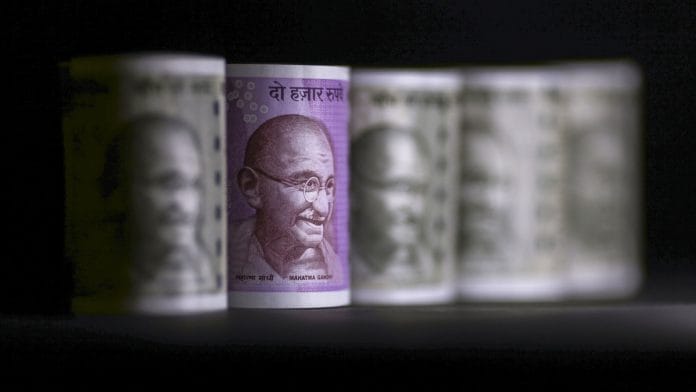New Delhi: Finance Minister Nirmala Sitharaman Saturday raised India’s fiscal deficit projections to 3.8 per cent in 2019-20 from the initially budgeted 3.3 per cent.
The fiscal deficit for 2020-21 was projected at 3.5 per cent in the Union Budget.
Falling tax revenues in the face of an economic slowdown have adversely impacted government’s ability to adhere to the fiscal glide path as set in the Fiscal Responsibility and Budget Management Act. According to the FRBM Act, India should have achieved the fiscal deficit target of 3 per cent in 2020-21.
The Indian economy is estimated to grow at an 11-year low of 5 per cent led by a sharp fall in consumption and investment.
In her budget speech, Sitharaman said the government used the deviation allowed in the FRBM Act of 0.5 percentage points in both 2019-20 and 2020-21. She said the Act allows this deviation from fiscal deficit roadmap for bringing in structural reforms.
ThePrint had reported in December the government’s plan to deviate from the fiscal deficit glide path.
Survey advice
The Economic Survey 2020 also batted for easing the fiscal deficit targets as it pointed out that expenditure compression in the face of falling revenues may not be ideal at the time of slowing growth.
“…there is an apprehension that the Tax revenue for the current fiscal year would be muted relative to the target envisaged in 2019-20 BE. The gap due to lower tax receipts could be to some extent compensated by higher mobilization of Non-Tax revenue and disinvestment proceeds for 2019-20. However, high growth in Non-Tax revenue may not be sustainable year after year,” the survey said.
It added that given the sluggish demand and decline in the growth of private consumption expenditure reported in the first half of the fiscal year, any cut in expenditure, especially capital expenditure would have adverse implications for growth.
Data from the Controller General of Accounts showed that tax revenues in the first nine months of the fiscal were at Rs 9.09 lakh crore or at only 55 per cent of the budgeted full year target of Rs 16.49 lakh crore. The fall has been led by a lower than expected growth in corporate tax collections and goods and services tax collections.
While tax collections will widen the actual fiscal deficit numbers, the ratio of fiscal deficit to GDP also came under pressure because of the fall in nominal GDP estimates. The nominal GDP growth for 2019-20 is projected at 7.5 per cent by the National Statistical office, as against the budgeted 12 per cent.
Also read: GDP grew 6.1% not 6.8% last fiscal but rose to 8.3 % in demonetisation year






